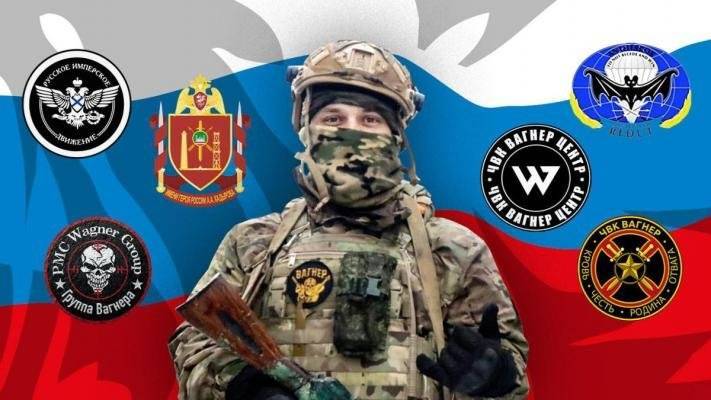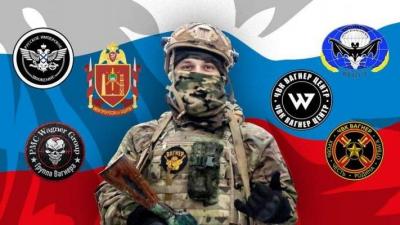The struggle for the "inheritance" of Wagner intensifies following the death of its leader, Yevgeny Prigozhin. Who will take the lion's share of the "legacy"? And who will win the favor of the Kremlin?
Russian security companies are vying to succeed "Wagner," seizing upon the deaths of Yevgeny Prigozhin and his right-hand man Dmitry Utkin. Emerging information points to the potential rise of "Redut," which may soon eclipse Wagner in fame and power. Known also as "Redoubt," it was initially established as "Shield." Notably, the company launched a campaign about a month ago through social media calling for people to join as heirs to Wagner, stating: "Forget about Wagner, it's in the past... join us." But what about this company? Who will be Prigozhin's successor in the realms of gold, combat, and power?
The beginnings of the Russian security company trace back to 2008, designed for counter-terrorism, specifically to protect the business operations of major Russian companies. It's considered a "family" of military and security companies sharing similar names that evolved to participate in military operations in Syria and Ukraine. The company was founded in 2008 as a merger of various seasoned groups from the Russian Foreign Intelligence Service, the Russian Air Force, and units from the Ministry of Defense, all of whom gained combat experience in military and peacekeeping tasks.
In the coming days, the name of the company's owner, who Prigozhin always kept in the shadows, is set to shine. He is the Russian businessman and billionaire "Gennady Nikolayevich Timchenko," who owns large groups including the "Volga" group and "Novatek" gas company, among others. Forbes ranked him 62nd globally among the wealthiest billionaires, and he has been one of the most powerful figures in Russia. Timchenko became friends with Putin in the 1990s in St. Petersburg when he and the Rotenberg brothers established a judo club called Yavara-Nevа. He heads several sports clubs and still serves as president of the Russian National Hockey League, holding Russian, Finnish, and Armenian citizenship. Following the Ukrainian war, Timchenko was sanctioned by the U.S. in 2014 and by the EU and the UK in 2022, to which he responded: "You have to pay for everything in life. Even for your friendship with the president."
According to Norwegian researchers from the Norwegian Defense Research Establishment, "Redut Anti-Terror" emerged in 2008 from the company (PMSC Antiterror Orel), which was founded in 2003 by members of Russian special forces. It is a branch of the anti-terrorism unit (Orel, Tiger Top Rent Security), primarily recruiting soldiers from the special reconnaissance brigade of the 45th Russian Guard until 2022, before forming "Redut" to protect Russian convoys and corporate properties, including oil production facilities and Russian diplomats in numerous countries worldwide, such as the facilities owned by Gennady Timchenko’s "JSC Stroytransgaz" in Syria during the Syrian civil war. It also provided military training, particularly for Russia-aligned Abkhaz forces during the Russian-Georgian war.
In 2022, with the Russian invasion of Ukraine, "Redut" was planned to be a major competitor to the Russian Ministry of Defense in the realm of private military companies, contrasting with the Wagner Group. The plans were organized by Deputy Head of Russian Intelligence, General Vladimir Alexeyev, who appointed Anatoly Karazi, a relative, as its leader, despite ownership by Timchenko. The company recruited several former Wagner members and special forces, totaling several thousand by January 2022, which angered Prigozhin. In that same month, he was invited to the office on Khoroshievskoye Highway, where he initially warned Alexeyev that if Karazi did not stop recruiting "Wagnerites" for Redut, he would kill Karazi. Supposedly, Alexeyev invited Prigozhin to another office where Karazi awaited him with a proposal to resolve the issue. According to sources, Prigozhin was surprised and stated he was misunderstood, retreating later on.
"Redut" played a crucial role in the early days of Russia's invasion of Ukraine. Sources indicate that the company sent a team to assassinate Zelensky on the first day of the invasion in an attack on Kyiv. Alexeyev was involved not only on the military side but also with the political aspect, needing to organize a transfer of power to new hands and negotiate with Ukrainian politicians, such as Azarov. Many of the plans from Russian military intelligence were known in advance to Western and Ukrainian intelligence. In the Kyiv attack, the company suffered heavy losses, as the combat team was severely attacked, withdrawing from the Ukrainian scene and leaving the field open for "Wagner."
After withdrawing from Ukraine, what remained of the combat group returned to Kubinka and was offered contracts by the Russian Ministry of Defense to serve officially in the armed forces. Despite the heavy losses, the number of "Redut" soldiers grew to about 7,000 in 2023. Following Wagner's attempted coup, the Russian Ministry of Defense tried to dissolve it by absorbing parts of Wagner or taking control. "Redut," along with the security company "Convoy," played key roles, directly benefiting from these actions as entities controlled by the government. Experts estimate that "Redut" is a leading candidate and potential rival to take over Wagner's operations in Syria and other countries following the "decapitation of Wagner’s leadership," despite noting it doesn't have the same level of combat experience comparatively. In July, Wagner mercenaries in Syria and Ukraine were offered to transition to "Redut," which is experiencing active competition with Wagner.
In August, a military institution noted that efforts to dissolve Wagner were partially successful, with two high-ranking Wagner representatives and leaders, Andrey "Sedoy" and Trushiev and Vadim F (pseudonym: "Khrystal"). It appears that the Ministry of Defense is using defectors to recruit individuals from the Wagner group under a promise of new missions in Africa. Shortly before the deaths of Wagner founders Prigozhin and Dmitry Utkin, "Redut" began preparations to enter Africa, focusing recruitment efforts in that area. iStories found posts on social networks urging people to join "Redut" with messages stating: "Wagner is in the past now. If you're genuinely interested in real work in Africa, the Ministry of Defense and Redut are your choices."
According to an investigation by the Russian edition of (RFE/RFL), "Redut" actively placed advertisements on Russian social media about a month before Prigozhin's assassination. The official application requirements are between the ages of 25 to 45, military experience, and no ongoing criminal charges (previous convictions are accepted except for child sexual offenses, drug trafficking, or rape), along with medical certificates indicating the absence of tuberculosis (X-ray) and hepatitis and HIV. However, one member of the formation indicated that the requirements are much lower. It has been leaked that representatives of the company are recruiting convicts from maximum-security prisons. Payments for injury, death, and residence are determined. Since the annexation of four Ukrainian regions, salaries have been paid in rubles instead of dollars, as the regions are no longer considered foreign.
"Redut" is believed to have a unit called "Don Brigade" (also known as "Don and Union of Donbass Volunteers"), which is a volunteer detachment comprising many ethnic Cossack fighters linked to the Russian Ministry of Defense. The contractors are recruited and paid by the company, which operates as a financial institution. It consists of the "Terek" battalion, along with two other recruitment battalions - "Kuban" and "Yenisei."
In early 2023, Gazprom Neft, a subsidiary of Gazprom, received permission from Russian Prime Minister Mikhail Mishustin to form a private military and security company. According to research by "BBC News" in Russian, the organization began in the city of Omsk under the name "Gazprom Neft Security," led by high-ranking former Russian Federal Security Service and Ministry of Internal Affairs members. The three main formations are "Vakul" (Torch), "Potok" (Stream), and "Plamia" (Flame), which are under the control of the Russian Ministry of Defense. Later in April, members of the volunteer military formation of Gazprom's "Potok" were compelled by the Russian Ministry of Defense to sign contracts with "Redut" to fight with "Potok" under the leadership of "Redut."
"Redut" contracts with the Russian Ministry of Defense and receives funding through it. Reportedly, the main supporters of the company are Oleg Deripaska and Gennady Timchenko, according to the website (Gulagu.net) founded by Russian defector Vladimir Osechkin, who cites the deputy commander of Redut providing testimony under aliases.
On February 24, 2023, "Redut" was classified as a Russian mercenary force—controlled and connected to Russian military intelligence—by the U.S. Treasury, which imposed sanctions against it following Executive Order "E.O. 14024" from the United States and seized its properties within the United States.
"Redut" participated in Ukraine's seizure of Chernobyl, the attack on Kyiv, and was later ordered to perform a secret mission to infiltrate and eliminate Ukraine's political leadership and security service. From the beginning, "Redut" also engaged in the Battle of Donbas, including the Battle of Kharkiv, the Battle of Seversk Donetsk, and the Battle of Balakliia. As of mid-July 2022, two detachments of "Redut," each comprising 200 fighters, were operating in the Donbas region of Ukraine, both led by former leaders of the Wagner Group.
There are indications that the organization provided advisors and military trainers to Abkhaz units during the Russian-Georgian war. It also operated in Lebanon, Iraq, Syria, Somalia, the Caribbean countries, former Yugoslavia, as well as Afghanistan and Indonesia. Its services included the deployment of snipers, scouts, and guards. Formations were deployed to protect corporate convoys and properties—including oil production facilities, military installations, and Russian diplomats, such as defending facilities of (JSC Stroytransgaz) in Syria. To consolidate its presence in the Iraqi environment, the company received direct support from Russian intelligence.
According to "The Telegraph," "Redut," controlled by Russian military intelligence, is among the potential successors to "Wagner," which left Yevgeny Prigozhin's group leaderless. The newspaper states: "Although it is funded by the Russian state and relies on the Ministry of Defense for munitions, it has expanded to a massive size and achieved a level of autonomy, a notorious reputation, and battlefield success that few private armies can boast. During Prigozhin's era, it also amassed a large business portfolio, acquiring oil, gold, and nearly every other mining exploitation privilege in every country it operated in. With Prigozhin's death, a group of rival Russian mercenary companies will seek to seize its combat tasks and business assets. Among these groups is Redut, or Redoubt—an intelligence-controlled group that started as a convenient arrangement between the Kremlin-linked oligarchy and senior military officers.”
The newspaper adds: "There are reports that Andrey Troshev, one of the prominent Wagner leaders remaining after the plane crash on Tuesday, has already taken a position in the competing group. At one time in 2022, Sergey Aksyonov, the Kremlin-appointed governor of annexed Crimea, formed his private military company called 'Convoy,' declaring: ‘The era of the bare-zulu soldier with an AK-47 is over.’ He added: 'We will provide African soldiers with new weapons and teach them how to use them.'"




